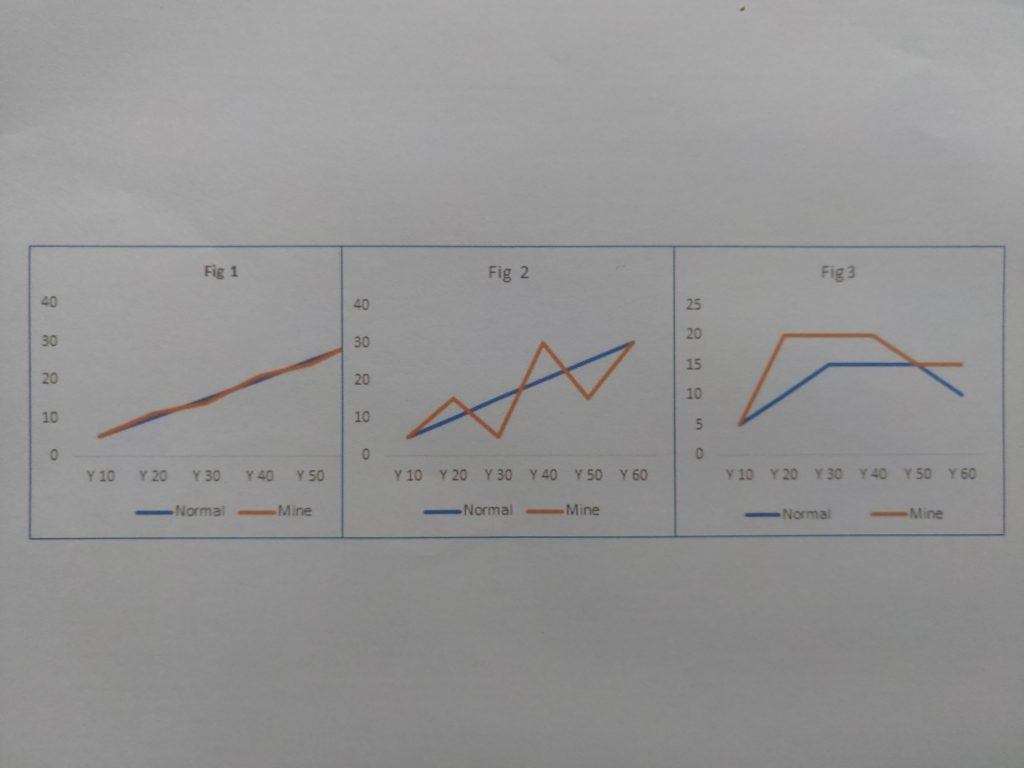“Nothing succeeds like success” are famous words that imply that success follows success. SUCCESS has been defined by many in different ways. Missy Yost gave us nineteen definitions. And there can be many beyond those nineteen, such is the enigma of what SUCCESS means. I have given this regular thought but a recent webinar (https://bit.ly/Wakeupspeakup) provoked a deeper dive into this subject. I therefore decided to try and put a visual to it!

Here are three out of many possibilities. The blue line symbolises what I think could be a series of normal success lifecycles. The first thought is a simple straight line that moves linear with age and experience (Fig 1 and 2). There could also be a “new” normal “success” much like a bell curve in the cycle of life (Fig 3). There can be several other normative perceptions of success. The orange line is anybody’s personal story where success could be linear, zigzag, or meandering – will differ by individuals. Which of these looks like your success graph? Is there another visual that you resonate with? Or indeed, does this statistical analogy of success bother you as it does me?
We know that success means different things to different people. It could be a measure of wealth, a happy family, a top leadership role – anything that an individual may feel for herself. I strongly believe that the last thing to measure success is comparison with others. I subscribe to the view that success is in one’s own mind or feeling. Further, it need not be an outcome or result – it could be an activity or process that may not yield any result. Great leaders often quoted, Mahatma Gandhi or Martin Luther King, are examples of those whose success was the establishment of a legacy that they did not live to see. I would have loved to ask them if they perceived themselves as successful since they are now portrayed by all as examples of successful leaders.
What then is success to a daily wage labourer who struggles to get food on the table every day? Nobody can take away the success of earning his or her daily wage from this protagonist. It is therefore also apparent that success works at two different levels – primary and tertiary. At a primary level, success is about survival, At the tertiary level, it is for sustenance. It is at this tertiary level that the connotation of success becomes variable and open to philosophical conclusions. It seems obvious to me that once we have our basic needs met, our perception of success changes. This is the subject of psychology of which I am no expert – lest to say that there are levels and some of us are privileged to think of sustenance beyond mere survival.
It is equally true that statements such as “success is all about you”, or “it is in your mind” etcetera seem hollow when one’s struggles try to make sense of it. I also fear that trying to define SUCCESS by getting philosophical about it may be a sign of denial. Do we say that success is only about you and not comparable with anybody else because the gap is obvious? Two persons were at the same level in an organisation ten years ago. One moves on to start something on his own, the other becomes CEO of the organisation. Three questions arise – First, who is successful? Second, who is perceived to be successful? Third, who answers these questions??
Let’s stay with the argument that success is for the individual to determine. In my view and experience, I am convinced that SUCCESS is about SELF-WORTH. I do things big and small and make a success or a failure with both. For example, when I completed my Chartered Accountancy in 1988-89, it was a qualification I had taken for granted as a must-have and I succeeded both, for me and in the eyes of others. Later, when I completed yet another professional qualification, my self-worth increased manifold, I was successful in my mind, but the second qualification meant little to anybody else. It therefore seems to me that if I am back home in the day satisfied that I added value to others and to me, I succeeded because I experienced a high level of self-worth. The days something does not go well – when I think I fell short – I do not feel that taste of success. Why, because in that moment my worth feels below par. If one can sleep at night, satisfied that we have taken care of people in our charge and have lived our values, we are SUCCESSFUL. At the other end of the spectrum, I may have delivered a result, my target or my sale for the day, but I got it not living my values, I will not feel like I succeeded because my self-worth was heavily depreciated. Think about it and please respond, if you like, with one or more thoughts about the following:
- What adjective describes best your notion of SUCCESS?
- What is your perception of the ‘normal success’ BLUE line?
- What is your ORANGE line experience of SUCCESS?
